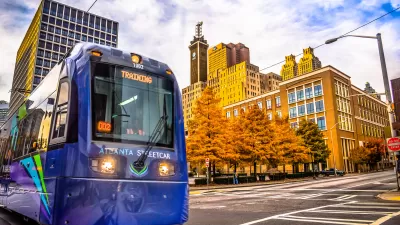Voters in the Atlanta metro area overwhelmingly rejected a 1% sales tax increase to fund $7.2 billion in transportation improvements. The result is being framed as a victory for anti-government Tea Party allies and a loss for the region's economy.
The decisive failure of the referendum (63% opposed), which would have funded "a $6.14 billion list of 157 regional
projects - relieving congestion at key Interstate highway chokepoints and
opening 29 miles of new rail track to passengers, among others - as well as
$1 billion worth of smaller local projects," was "fueled by citizens' distrust of
government and the metro area's splintered transportation desires," writes Ariel Hart.
"'It's heartbreaking,' said Ashley Robbins, president of Citizens for
Progressive Transit, one of dozens of organizations that worked for the
referendum. She predicted a loss of valuable young workers to the region's
economy. 'If Atlanta's not the region that we want, the young energetic
people that drove these campaigns are going to leave.'"
Of course, the majority of voters applauded the result. Writing in the Atlanta Journal-Constitution, Craig Schneider saw the defeat of the referendum as "a big win for the Georgia tea party, whose
leaders didn't shy away Tuesday night from claiming giant-slayer status."
According to Bob Grafstein, assistant dean of the University of Georgia's school of public and international affairs, the results, "make [the tea party] look like people protecting the average citizen from the rapacious government."
Rounding out AJC's coverage, Jim Galloway charts the course forward for efforts to improve "the mess that is Georgia's system of planning and paying for moving goods and people." According to Galloway, the ball will now bounce to Gov. Nathan Deal's court.
"What voters dismissed was a bottom-up list of $8 billion in road and rail projects created by local elected leaders. The Plan B that staggered out of the governor's office will be its polar
opposite: Dramatically smaller, paid for with shrinking funds, and
highly centralized. Projects will be hand-picked by a governor who
intends to squeeze every penny available."
FULL STORY: Voters reject transportation tax

Trump Administration Could Effectively End Housing Voucher Program
Federal officials are eyeing major cuts to the Section 8 program that helps millions of low-income households pay rent.

Planetizen Federal Action Tracker
A weekly monitor of how Trump’s orders and actions are impacting planners and planning in America.

Ken Jennings Launches Transit Web Series
The Jeopardy champ wants you to ride public transit.

Rebuilding Smarter: How LA County Is Guiding Fire-Ravaged Communities Toward Resilience
Los Angeles County is leading a coordinated effort to help fire-impacted communities rebuild with resilience by providing recovery resources, promoting fire-wise design, and aligning reconstruction with broader sustainability and climate goals.

When Borders Blur: Regional Collaboration in Action
As regional challenges outgrow city boundaries, “When Borders Blur” explores how cross-jurisdictional collaboration can drive smarter, more resilient urban planning, sharing real-world lessons from thriving partnerships across North America.

Philadelphia Is Expanding its Network of Roundabouts
Roundabouts are widely shown to decrease traffic speed, reduce congestion, and improve efficiency.
Urban Design for Planners 1: Software Tools
This six-course series explores essential urban design concepts using open source software and equips planners with the tools they need to participate fully in the urban design process.
Planning for Universal Design
Learn the tools for implementing Universal Design in planning regulations.
Ada County Highway District
Clanton & Associates, Inc.
Jessamine County Fiscal Court
Institute for Housing and Urban Development Studies (IHS)
City of Grandview
Harvard GSD Executive Education
Toledo-Lucas County Plan Commissions
Salt Lake City
NYU Wagner Graduate School of Public Service



























